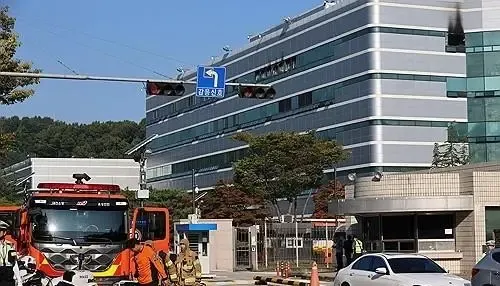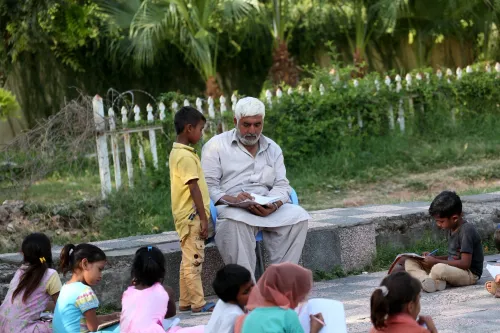What Happened in South Korea After a Fire at a Data Centre?

Synopsis
Key Takeaways
- Fire outbreak at South Korea's central data centre.
- Battery explosion led to widespread service disruptions.
- 647 government services currently offline.
- Priority restoration for critical services like postal and financial systems.
- Government to mobilize all resources for a swift recovery.
Seoul, Sep 27 (NationPress) A significant fire incident at South Korea's central state data centre has resulted in major government online services and networks being rendered offline on Saturday. This disruption was triggered by a battery explosion, with recovery timelines still uncertain.
The fire ignited at the National Information Resources Service located in the central city of Daejeon, following the explosion of a lithium-ion battery within a computer room on the fifth floor.
According to officials, the explosion took place in one of the uninterruptible power supply batteries while staff were in the process of relocating them to the basement.
As of Saturday morning, the fire has incapacitated 647 online government services and systems, including critical services like the mobile identification system and online postal services.
South Korean Vice Interior Minister Kim Min-jae stated that operations had been halted as a “preemptive” measure to protect systems after the fire led to malfunctions in temperature and humidity controls, which could cause overheating.
“Repair work on the temperature and humidity control equipment is ongoing. Once completed, we will work to bring the servers back online to restore services,” Kim mentioned during a press conference, emphasizing that essential services such as postal and financial services will be prioritized for restoration.
The outages have disrupted the location-tracking capabilities of the 119 emergency service, the online official document issuance service, and the pan-government Onnara System, leaving officials unable to access key administrative systems.
Websites of major government entities, including the prime minister's office and the ministries of interior and finance, continue to be inaccessible.
These disruptions are estimated to have affected nearly one-third of the government's total online information systems.
Citizens expressed frustration over the service interruptions. A 53-year-old individual identified only as Lee attempted to make a payment with a debit card from Korea Post at a convenience store in Uijeongbu, north of Seoul, only to find it non-functional.
Others reported that money transfers via Korea Post financial accounts were unavailable, according to Yonhap news agency.
Approximately 10 hours after the fire outbreak, the main blaze was brought under control by 6:30 a.m., although it partially reignited later in the morning.
Firefighters were actively ventilating the building. Around 200 firefighting personnel were dispatched, along with numerous fire trucks and other equipment.
One worker involved with the batteries sustained first-degree burns on the arms and face, while nearly 400 lithium-ion battery packs were destroyed in the blaze.
During an emergency meeting on Saturday morning, South Korean Interior Minister Yun Ho-jung elevated the crisis management level for government information systems from “alert” to “serious”.
“The government will mobilize all available resources to resolve this incident swiftly while minimizing public inconveniences,” Yun stated.
South Korean Prime Minister Kim Min-seok issued an apology for the service disruptions, assuring that the government is committed to restoring the affected services.









